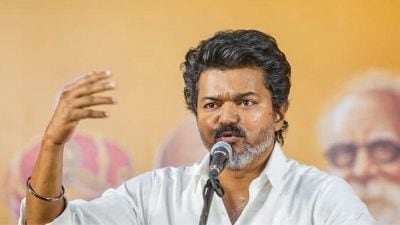Tiger by the Lotus pond: Maha drama
When BJP President Rajnath Singh told Uddhav Thackeray, his younger counterpart in the Shiv Sena, that all was well and “we are not going to part with you”...

When BJP President Rajnath Singh told Uddhav Thackeray, his younger counterpart in the Shiv Sena, that all was well and “we are not going to part with you”, it was the BJP leadership’s way of trying to rein in its foot soldiers in Maharashtra who have been at their vitriolic best ever since the Sena “betrayed” them by backing Pratibhatai’s candidature for president. But now that Pratibha Patil is the bona fide resident of Rashtrapati Bhavan and the Sena has underlined its unflinching commitment to the cause of the Marathi Manoos by supporting her, will the feuding allies declare truce?
The BJP central leadership certainly wants things to calm down. At a time when Mamata Banerjee in Bengal seems ready for a turnaround and the Janata Dal(S) in Karnataka looking extremely reluctant to hand over power, the BJP realises it has to make the extra effort to save the alliance with the Sena, its only ally that unabashedly subscribes to its core philosophy of Hindutva.
Never mind who said what in the run-up to the presidential polls. Uddhav’s — or more likely his father, Bal Thackeray’s — was quite the masterstroke. When he declared support for Pratibhatai, it was the Sena’s way of zeroing in on a meeting point between Hindutva and the issue of Marathi. Chhatrapati Shivaji was a Marathi, who also established Hindavi Swaraj, it was pointed out. This stunned local BJP cadres and leaders who were in no mood to reason with the compulsions of its ally of over two decades. So state BJP chief Nitin Gadkari asked partymen to get ready to contest elections on their own, implying that the party was looking to go it alone in the 2009 state elections. General secretary Gopinath Munde hinted at a covert deal with the Congress, whereby it would ensure that Narayan Rane, a Sena rebel, would not be made chief minister. More importantly, he even tried to demolish the Sena’s ‘Maratha pride’ argument by citing how it had backed Shekhawat against the Congress’s Sushil Kumar Shinde, a Maharashtrian, in the 2002 vice-presidential polls.
But Uddhav maintains that the decision on the future of the ties lies with the BJP, whose leaders are the ones who questioned its relevance in the first place. After all, this isn’t the first time that ties have soured — recently, it was the Chimur bypolls that both parties were adamant on contesting, which was the flashpoint. Ultimately, the Sena made way for the BJP with the understanding that it would fight another byelection with BJP support.
Even in the assembly, much to the glee of the ruling Congress-NCP combine, the Sena-BJP opposition makes no effort to conceal their differences. The Sena is vehemently opposed to SEZs, for instance, but the BJP argues that they are crucial for development. In the assembly, too, the two parties find themselves inhabiting different poles occasionally. The BJP wanted serious House time on malaria and dengue in Mumbai, much to the chagrin of Sena, which controls Mumbai’s municipal corporation, and is therefore directly in the line of fire when it comes to health emergencies of this kind.
The reality is that the BJP needs the Shiv Sena more than ever before. It is something that Rajnath Singh is able to grasp instantly and what the Gadkaris and Mundes don’t wish to acknowledge. With most of its friends in other states sitting on the fence, the BJP has to shore up relations with alliance partners, more so in Maharashtra where the Sena can be the best local interpreter of its Hindutva core.
Today, Balasaheb is a lion in winter nursing his wounds; the exit of an ambitious nephew (Raj) and the rebellion of a one-time trusted lieutenant (Rane) have left him with his own share of problems. But for the Sena, emboldened as it has been by a thumping victory in the Mumbai municipal corporation, it makes political sense to stage a grand show of confidence.
It all boils down to what the late Pramod Mahajan — the BJP must be missing him — understood a long time ago. In The BJP and the Compulsions of Politics in India, edited by Thomas Hansen and Christophe Jaffrelot, he explained why the BJP must continue to play ball with the Sena despite its tantrums. As he put it: “Slowly, from 1985-87, the Sena was solely in charge of the Hindu wave in the country… My problem was that if I am not with the Shiv Sena then the Shiv Sena would slowly kill me and capture my entire constituency. If you cannot beat them you join them.”








- 01
- 02
- 03
- 04
- 05























